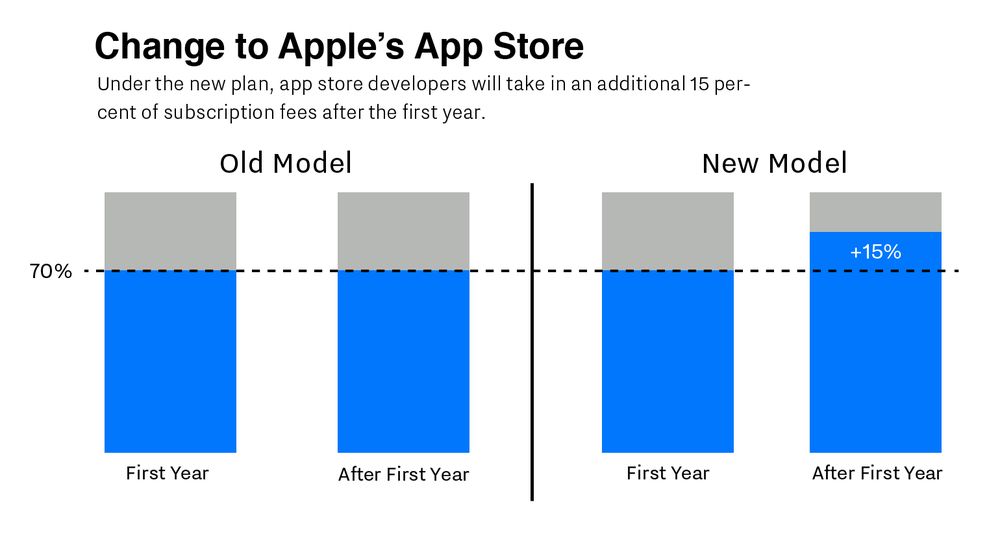New iOS App Store tweaks: Pros & Cons for Developers & Users
It’s been a sobering time for App developers, who have been struggling for quite some time to get their apps out there; downloaded, installed and used by users. And ask not what they haven’t done! From growth hacks, contests, campaigns, giveaways, to lucky draws they have done every bit of crazy marketing that can be thought of!
At one end, an average new app developer needs to compete with over 1.5 million apps in the App store to get noticed by users. At the other end, studies show that most of the smartphone users in the US download zero apps in a typical month, or simply don’t use most of the apps installed. Customers are tired of downloading new apps only to find them useless. Of course, they then uninstall it later to save space.
Altogether, with both the app and device sales showing a drop in the last quarter, the industry players have clearly decided not to sit back and relax at this dent in their revenue. The recent tweaks and improvements to the Play store and App Store are thus justified!
Apple’s turn to give a fresh look & feel to its App Store
Apple, for instance, wants to bring that new and fresh feel to its iOS App Store, through various improvements which were announced last week, before its Worldwide Developers Conference. The aim is to:
- Help the developers boost their revenue in a market where retaining users has become a big deal,
- Put the relevant apps in front of the right audience, and
- Cheer developers through fast App review processes.
How the changes will impact Developers and Users
Subscription based pricing
Though ‘App subscriptions’ already existed for certain app categories in the App Store, which offered news, subscription content, certain cloud services and the like (for e.g. Netflix, Spotify, The New York Times, Dropbox etc.), it was missing from the category that made up 75% of App Store’s revenue- Games! So this time, Apple has announced subscription-based pricing to all app categories, including games and productivity apps in the intervals of 2 months, 3 months or 6 months, in addition to the annual/monthly subscription intervals.
Other notable changes:
- Subscription Fee: Developers also have the right to change the subscription fee with the subscriber’s approval.
- Territory based pricing: Allows developers to charge lower subscription fees in countries like India and China.
- Rewarding developers for customer retention: Apple will reward developers who manage to retain their customers for more than a year with a fairer revenue split. From 70% revenue to developers & 30% to Apple in the first year to 85/15 in remaining years for which the user remains subscribed to the app).
Pros:
· The developers get a chance to earn more if users keep their apps installed for more than a year. And they shouldn’t worry about app upgrade funding due to this recurring revenue they receive.
· A subscription fee for games make a lot of sense for game developers. As it has worked for games on other platforms, it wouldn’t be unfamiliar to them too.
· This subscription fee model may not work for Apps that are used occasionally, but regularly used apps that assist many professional audiences (productivity apps) will benefit more from this.
Cons:
The pros outweigh the cons as this move seems to be a bonus for developers who had already learned to live with the basic revenue. However, this switch from one-time / in-app purchase model to a subscription-based model wouldn’t happen smoothly overnight and developers will have to plan on how to implement it for their apps.
Users may however, lose the privilege of enjoying apps and their unlimited updates free for eternity. Nevertheless, they will get to enjoy even more quality updates and sustainable apps from some motivated developers.
Top beneficiary: App Developers
Search Ads & App Discovery
In App Store, developers will be able to buy search ads for keywords soon (determined by a price auction & relevance metric), like how Google does. It will display an ad (1 pay-for-click ad at a time) at the top with a light blue background placed in the search results page (only). The ad appearing will be relevant to the search terms entered by the user. The ads however, can’t get any user information or their tracking details from the App Store.
Other changes:
- Categories Tab: Apple is bringing back the categories tab. The featured tab will look smarter.
- Boosts app discovery through word of mouth: long pressing an app on the home screen will let you recommend it to your friends.
Pros:
· Better App marketing by targeting the right audience: Apple’s senior vice president of marketing, Phil Schiller mentioned that paid search ads would give developers a solid place for marketing their apps(other than the comparatively less effective social media marketing or online adverts), where they can target exactly the specific groups that matter to them. “There are hundreds of millions of searches on the App Store every week and 65% of app downloads are driven by search,” he said.
· App discovery and exposure: Developers and indie (independent) developers will have the opportunity to purchase ads for keywords, giving better exposure for their apps. This reduces the complexity level for indie developers to publicize their apps.
· New & less popular app discovery: Apple aims at giving a fair chance here to new apps in those categories which do not have a lot of ratings or user recommendations like the already established apps. These unpopular, yet smart apps can win ad auctions and appear during searches.
Cons:
Apple wouldn’t refuse to display a useless app’s ad either. Search would also display a junky app from a deep-pocketed company with high marketing budgets, who can win the auction for the keyword and have their app ad displayed at the top.
Top beneficiary : Users
Schiller says, “We’ve thought about how to carefully do it in a way that, first and foremost, customers will be happy with”, also adding that he believes it will be “fair to developers, and fair for indie developers, too.”
APP review times
The shortened app review period would be a great relief to developers who will get a faster turnaround time. Earlier, the turnaround time was measured in ranges of days and weeks once the app is submitted to App Store for review. But According to Schiller, now 50% of apps submitted for approval are reviewed within a day and 90%within two days. This change is only due to better tools, staffing and policy improvements and doesn’t change any rules for the app approval process at all. (See 11 Quick tips for faster approval of your IOS app)
“App approval now happens within hours of submitting them, which is really awesome because it speeds up the development cycle.”- Chris Maddern, app developer for Uber Technologies Inc. and Foursquare Labs Inc.
Pros:
· Faster app review turnaround time has only benefitted iOS app developers. Delaying app launches were one disadvantage of App store over Google Play, not anymore.
· Developers can fix the bugs faster, experiment new features more often, react quickly to the demands and market changes, while being loyal to Apple’s rules and regulations.
Top beneficiary : App Developers
These plans will be implemented over the next few months. Ads have already been made a part of the beta program since Monday. Subscriptions will be handy for developers in the fall, while revenue split for app makers who have retained customers for over a year started from June 13.
The App store has been steadily improving since the beginning of the year and Schiller says he has a secret team noting and listening, to explore what further improvements can be brought to the App Store.
Pic Courtesy: The Verge, Google/Ipsos, Mobile App Marketing Insights: How Consumers Really Find and Use Your Apps (U.S.)
Stay up to date on what's new

Recommended Posts

17 Jan 2019 Manufacturing Retail
iOS 12 Application Development Features That Can Benefit Enterprises In 2019
iOS 12 is now live and represents the latest evolution of Apple over its decade long existence. Today, Apple’s App Store has over two million apps with over 170 billion……

30 Mar 2017 Education
Engaged Software Developers can Result in Happy Clients
The mantra of success in today’s hyper-competitive and tech-neutral age is offering unmatched value, topped up by incredible experience, to customers. With the focus on the end product, most enterprises……
Featured Blogs
Stay up to date on
what's new












